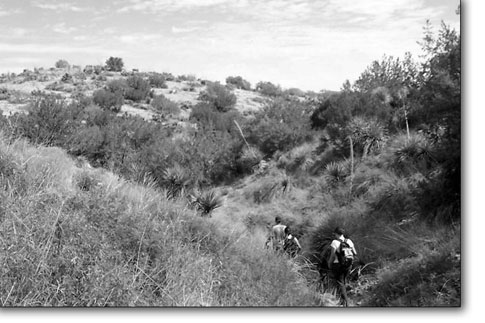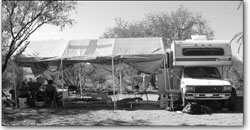| ||||
| The crime of compassion Former Durangoan fights border arrest in landmark case SideStory: A call for humane immigration
by Will Sands On July 9, Shanti Sellz was pulled over in the vicinity of Arivaca, Ariz., handcuffed and arrested by the U.S. Border Patrol. The 23-year-old former Durango resident and 23-year-old Daniel Strauss were both incarcerated, charged with two felony counts each and are now facing up to 15 years in prison. Their crime? Showing compassion to three illegal migrants. But Sellz and Strauss are fighting the charges, and the case could be a legal landmark and change how people who are literally dying along the U.S./Mexico border are treated. Sellz left Durango in 2004 to take a job as a nanny in the border town of Bisbee, Ariz. She was immediately shocked by the situation along the border, where migrants were crossing large areas of the Sonoran Desert without food or water, often perishing along roadsides without help from U.S. residents living in the area. “I had no idea about the current conditions of the border,” Sellz said. “People are terrified to help each other for fear of prosecution.” Sellz promptly overcame her own fear of prosecution and began working with the direct action group, Citizens for Border Solutions. She volunteered her time in relief camps outside of the Tucson area and made numerous trips into the desert, leaving water and food caches for people in need. Eventually, she got involved with No More Deaths, a coalition formed in 2003 in response to human rights abuses along the border. Since 1998, more than 2,000 men, women and children have lost their lives attempting to cross the arid and unforgiving lands. No More Deaths works to counter this trend with movable desert support camps, support of migrant aid centers, maintenance of water stations, Samaritan patrols searching the desert for migrants in need, and advocacy on behalf of migrant-related issues. “The death toll has been rising incrementally over time,” Sellz explained. “This year, there have already been 282 documented deaths, and there are typically three additional bodies for every one that is found.” This summer, Sellz began work at a No More Deaths camp near Arivaca and took part in many Samaritan patrols. “We usually find people who are alone and wandering the desert or groups of two or three who can’t go any further and have been left behind,” she said. “Everyone we encounter always needs food and water, and we give much-needed support. In severe cases, we evacuate people to medical facilities. It’s humanitarian aid, nothing more.” On July 9, Sellz and Strauss came upon three migrants near the Arivaca camp in desperate need of help. Two were ill and covered in blisters. A third was vomiting and had severe diarrhea. After consulting with two doctors and a nurse, Sellz and Strauss realized the third individual was in danger of liver failure and death and that all three were in need of immediate medical attention. The volunteers then consulted an attorney and were advised to take the migrants to the nearest medical facility. However, they were pulled over and arrested by U.S. Border Patrol en route.
Sellz and Strauss were charged with two felony counts each: one for transportation of an undocumented person and the other of conspiracy of smuggling. The pair was arraigned on July 11. The fact that the car was even pulled over was unusual, according to Sellz. No More Deaths conducts all of its activities in plain view of the law and makes no attempts to hide its actions. “There’s question as to why in this instance we were even pulled over,” she said. “This was the first time in the organization’s three-year history that a member has been arrested. Everything has always been in full view of the Border Patrol. It’s all been transparent.” Following arraignment, Sellz and Strauss were offered a plea agreement from the federal prosecutor but rejected it. Rather than accepting one year of probation and time in a diversion program, Sellz and Strauss responded that they have committed no crime and something bigger than the two of them is on trial. “This is a really important case,” she said. “Humanitarian aid is what’s really on trial.” The future of life and death along the U.S./Mexico border will go to court in late December. Sellz commented that a victory in the case might dramatically improve the picture along the border. Defeat could worsen it. “Right now, migrants are dying along the side of the road in plain view of passing cars,” she said. “If Daniel and I win this case, hopefully American citizens living along the border will be empowered to help others, knowing that giving humanitarian aid is not a crime. If Daniel and I are convicted, it could become an even worse situation down there.” A federal grand jury will weigh the case on Dec. 20 and determine whether Sellz and Strauss are innocent or should spend up to 15 years behind bars for saving three lives. For her part, Sellz is confident that justice will prevail. “This has been taken further than I ever thought it would be,” she said in closing. “But I feel very confident that we will prevail. After all, the death toll is only rising every year, and it’s right in our back yard.” •
|
In this week's issue...
- December 18, 2025
- Let it snow
Although ski areas across the West have taken a hit, there’s still hope
- December 18, 2025
- Look, but don't take
Lessons in pottery theft – and remorse – from SW Colorado
- December 11, 2025
- Big plans
Whole Foods, 270 apartments could be coming to Durango Mall parcel



